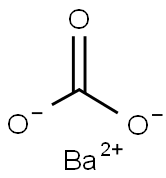PRODUCT Properties
| Melting point: | 1580 °C |
||||||||||||||
| Boiling point: | decomposes at 1580℃ [KIR78] |
||||||||||||||
| Density | 4.5 |
||||||||||||||
| bulk density | 500kg/m3 |
||||||||||||||
| storage temp. | Storage temperature: no restrictions. |
||||||||||||||
| solubility | water: insoluble |
||||||||||||||
| form | powder |
||||||||||||||
| Specific Gravity | 4.5 |
||||||||||||||
| color | White to yellow |
||||||||||||||
| PH | 3.5-10.0 (100g/l, H2O, 20℃)suspension |
||||||||||||||
| PH Range | 7 |
||||||||||||||
| Odor | wh. or ylsh. fine powd. free from grittiness, odorless, tasteless |
||||||||||||||
| Water Solubility | 0.0022 g/L (50 ºC) |
||||||||||||||
| Crystal Structure | Barite |
||||||||||||||
| crystal system | Nogata |
||||||||||||||
| Merck | 14,994 |
||||||||||||||
| Solubility Product Constant (Ksp) | pKsp: 9.97 |
||||||||||||||
| Space group | Pnma |
||||||||||||||
| Lattice constant |
|
||||||||||||||
| Dielectric constant | 11.4(16.0℃) |
||||||||||||||
| Exposure limits | ACGIH: TWA 5 mg/m3 OSHA: TWA 15 mg/m3; TWA 5 mg/m3 NIOSH: TWA 10 mg/m3; TWA 5 mg/m3 |
||||||||||||||
| Stability: | Stable. |
||||||||||||||
| LogP | -1.031 (est) |
||||||||||||||
| CAS DataBase Reference | 7727-43-7(CAS DataBase Reference) |
||||||||||||||
| EPA Substance Registry System | Barium sulfate (7727-43-7) |
Description and Uses
Barium sulfate is available as odourless, tasteless, white or yellowish crystals or powder or polymorphous crystals. It is stable and insoluble or negligibly soluble in water, and on burning, it may produce sulphur oxides. It reacts violently with aluminium powder. It occurs naturally as mineral barite, barytes. It has wide use as inert filler and pigment extender in paints, primers, inks, plastics, floor tiles, paper coatings, polymer fibres, and rubber. It is used as the semi-transparent base (lake) for organic pigments and as a thixotropic weighting mud in oil well drilling. Barium sulphate is a contrast agent that is used to help x-ray diagnosis of problems in areas of the upper GI tract, like the oesophagus, the stomach, and/ or the small intestine. The raw barium sulphate has wide applications such as in the manufacture of lithopone, a white pigment in the manufacture of photographic paper, wallpaper and glassmaking, in battery plate expanders, and in heavy concrete for radiation shield.
Barium sulfate has many commercial applications. It
is used either as natural barite, or precipitated BaSO4.
The precipitated salt in combination with equimolar
amount of co-precipitated zinc sulfide formerly was
used as a white protective coating pigment, known as
“lithopone”. Similarly, in combination with sodium
sulfide, it is used to produce fine pigment particles of
uniform size, known as “blanc fixe”. Natural barite,
however, has greater commercial application than the
precipitated salt. It is used as an additive in drilling
mud in crude oil, well drilled to lubricate and cool the
drilling bit, and to plaster the walls of the drill hole to
prevent caving. It is used as a filler in automotive paints,
plastics and rubber products. It also is used as a filler in
polyurethane foam floor mats, white sidewall rubber
tires and as a flux and additive to glass to increase the
refractive index.
Barium sulfate is frequently used clinically as
a contrast agent for X-ray imaging and other diagnostic
procedures. It is most often used in imaging of the
gastrointestinal tract. It is administered, orally or by
enema, as a suspension of fine particles in an aqueous
solution. Although barium, and its water-soluble
compounds are often highly toxic, the extremely low
solubility of barium sulfate protects the patient from
absorbing harmful amounts of the metal. Barium sulfate
is also readily removed from the body, unlike prior
compounds, which it replaced. Its absorbance of Xrays
is also higher.
Barium sulfate mixtures are used as white pigment
for paints. In oil paint, barium sulfate is almost transparent,
and is used as a filler or to modify consistency.
One major manufacturer of artists’ oil paint sells
“permanent white” that contains a mixture of titanium
white pigment and barium sulfate. Barium
sulfate itself is called blanc fixe (French for “permanent
white”).
range. It is applied by spray painting to almost any
substrate (metals, plastics, glass) for use in integrating
spheres, laser cavities, lamp reflectors and display backlights.
It is characterized by a near-perfect Lambertian
(i.e. diffuse) reflectance of up to 98% in the spectral
range from 250 to 2500 nm.
Other chemical applications of barium sulfate are
used as a pigment for photographic paper. It is also
used to prepare many other barium salts. It is available
in many forms commercially.
Safety
| Symbol(GHS) |  GHS07 |
| Signal word | Warning |
| Hazard statements | H315-H319 |
| Precautionary statements | P264-P280-P302+P352-P337+P313-P305+P351+P338-P362+P364-P332+P313 |
| Hazard Codes | Xn |
| Risk Statements | 20/21/22-36/37/38 |
| Safety Statements | 22-24/25-36-26 |
| OEB | B |
| OEL | TWA: 10 mg/m3 (total) |
| WGK Germany | - |
| RTECS | CR0600000 |
| TSCA | Yes |
| HS Code | 28332700 |
| Hazardous Substances Data | 7727-43-7(Hazardous Substances Data) |
| Toxicity | LD50 orally in Rabbit: > 20000 mg/kg |


